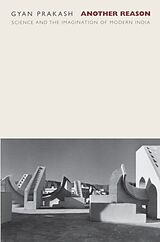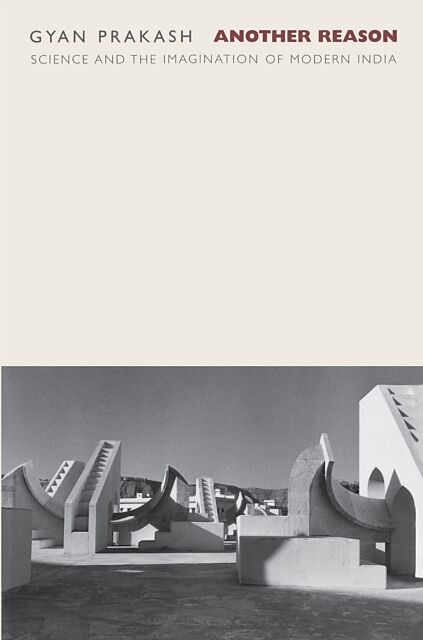Another Reason
Einband:
Kartonierter Einband
EAN:
9780691004532
Untertitel:
Science and the Imagination of Modern India
Genre:
Geschichte
Autor:
Gyan Prakash
Herausgeber:
Princeton University Press
Anzahl Seiten:
320
Erscheinungsdatum:
29.08.1999
ISBN:
0691004536
"Another Reason is an intelligent, sophisticated and lucid work of scholarship, which fills a major gap in the historiography of India."---Zaheer Baber, Times Literary Supplement
Autorentext
Gyan Prakash is Professor of History at Princeton University. He is the author of Bonded Histories, the editor of After Colonialism (Princeton), and a member of the Subaltern Studies Collective.
Klappentext
Another Reason is a bold and innovative study of the intimate relationship between science, colonialism, and the modern nation. Gyan Prakash, one of the most influential historians of India writing today, explores in fresh and unexpected ways the complexities, contradictions, and profound importance of this relationship in the history of the subcontinent. He reveals how science served simultaneously as an instrument of empire and as a symbol of liberty, progress, and universal reason--and how, in playing these dramatically different roles, it was crucial to the emergence of the modern nation. Prakash ranges over two hundred years of Indian history, from the early days of British rule to the dawn of the postcolonial era. He begins by taking us into colonial museums and exhibitions, where Indian arts, crafts, plants, animals, and even people were categorized, labeled, and displayed in the name of science. He shows how science gave the British the means to build railways, canals, and bridges, to transform agriculture and the treatment of disease, to reconstruct India's economy, and to transfigure India's intellectual life--all to create a stable, rationalized, and profitable colony under British domination. But Prakash points out that science also represented freedom of thought and that for the British to use it to practice despotism was a deeply contradictory enterprise. Seizing on this contradiction, many of the colonized elite began to seek parallels and precedents for scientific thought in India's own intellectual history, creating a hybrid form of knowledge that combined western ideas with local cultural and religious understanding. Their work disrupted accepted notions of colonizer versus colonized, civilized versus savage, modern versus traditional, and created a form of modernity that was at once western and indigenous. Throughout, Prakash draws on major and minor figures on both sides of the colonial divide, including Mahatma Gandhi, Jawaharlal Nehru, the nationalist historian and novelist Romesh Chunder Dutt, Prafulla Chandra Ray (author of A History of Hindu Chemistry), Rudyard Kipling, Lord Dalhousie, and John Stuart Mill. With its deft combination of rich historical detail and vigorous new arguments and interpretations, Another Reason will recast how we understand the contradictory and colonial genealogy of the modern nation.
Zusammenfassung
Another Reason is a bold and innovative study of the intimate relationship between science, colonialism, and the modern nation. Gyan Prakash, one of the most influential historians of India writing today, explores in fresh and unexpected ways the complexities, contradictions, and profound importance of this relationship in the history of the subcontinent. He reveals how science served simultaneously as an instrument of empire and as a symbol of liberty, progress, and universal reason--and how, in playing these dramatically different roles, it was crucial to the emergence of the modern nation.
Prakash ranges over two hundred years of Indian history, from the early days of British rule to the dawn of the postcolonial era. He begins by taking us into colonial museums and exhibitions, where Indian arts, crafts, plants, animals, and even people were categorized, labeled, and displayed in the name of science. He shows how science gave the British the means to build railways, canals, and bridges, to transform agriculture and the treatment of disease, to reconstruct India's economy, and to transfigure India's intellectual life--all to create a stable, rationalized, and profitable colony under British domination.
But Prakash points out that science also represented freedom of thought and that for the British to use it to practice despotism was a deeply contradictory enterprise. Seizing on this contradiction, many of the colonized elite began to seek parallels and precedents for scientific thought in India's own intellectual history, creating a hybrid form of knowledge that combined western ideas with local cultural and religious understanding. Their work disrupted accepted notions of colonizer versus colonized, civilized versus savage, modern versus traditional, and created a form of modernity that was at once western and indigenous.
Throughout, Prakash draws on major and minor figures on both sides of the colonial divide, including Mahatma Gandhi, Jawaharlal Nehru, the nationalist historian and novelist Romesh Chunder Dutt, Prafulla Chandra Ray (author of A History of Hindu Chemistry), Rudyard Kipling, Lord Dalhousie, and John Stuart Mill. With its deft combination of rich historical detail and vigorous new arguments and interpretations, Another Reason will recast how we understand the contradictory and colonial genealogy of the modern nation.
Inhalt
Acknowledgments ix CHAPTER ONE The Sign of Science 3 PART ONE SCIENCE AND THE RELOCATION OF CULTURE CHAPTER TWO Staging Science 17 CHAPTER THREE Translation and Power 49 CHAPTER FOUR The Image of the Archaic 86 PART TWO SCIENCE, GOVERNMENTALITY, AND THE STATE CHAPTER FIVE Body and Governmentality 123 CHAPTER SIX Technologies of Government 159 CHAPTER SEVEN A Different Modernity 201 CHAPTER EIGHT Divided Love 227 Notes 239 Bibliography 277 Index 295

Leider konnten wir für diesen Artikel keine Preise ermitteln ...
billigbuch.ch sucht jetzt für Sie die besten Angebote ...
Die aktuellen Verkaufspreise von 6 Onlineshops werden in Realtime abgefragt.
Sie können das gewünschte Produkt anschliessend direkt beim Anbieter Ihrer Wahl bestellen.
Loading...
Die aktuellen Verkaufspreise von 6 Onlineshops werden in Realtime abgefragt.
Sie können das gewünschte Produkt anschliessend direkt beim Anbieter Ihrer Wahl bestellen.
| # | Onlineshop | Preis CHF | Versand CHF | Total CHF | ||
|---|---|---|---|---|---|---|
| 1 | Seller | 0.00 | 0.00 | 0.00 |
